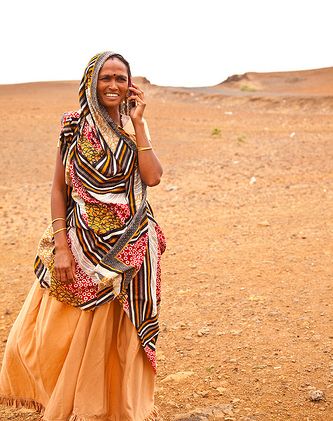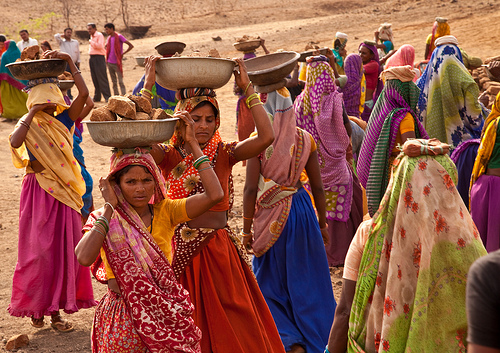Helping rural women demand services in Madhya Pradesh
Women in Madhya Pradesh are able to stand up for their basic rights thanks to the gram sabhas (village meetings) organized by UN Women. Issues that were once ignored by men are now being taken up by women.Date:
Jhabua - Beads of perspiration lined their forehead, their brows furrowed, the searing June heat did not dissuade over 500 villagers, mostly women, who walked miles at end to participate in the special Gram Sabha (public village meeting) organized by UN Women and the district administration in Khankhandvi Gram Panchayat (village council) of Madhya Pradesh.
During the meeting, most women highlighted the dire water shortage in the region. “Women collect water so they speak up for improving the existing water systems in the gram sabhas. They want more hand pumps and ponds,” says 38-year-old Gulabi Bahadur, Ward Panch (member of the village council), Vasuniya Phulia.
Panchayat officials, with the active participation of women, passed several resolutions that day. “It was decided to build hand-pumps and a community well, as well as a youth centre (Nehru Yuva Kendra), a girls’ hostel, a road and an anganwadi centre. Many women were happy to get more information about government schemes from district officials,” said Anshul Saxena, UN Women’s District Project Officer in Jhabua district.

Vandana Bahadur Maida, elected sarpanch of Khankhandvi Gram Panchayat, Madhya Pradesh. Photo credit: UN Women/Gaganjit Singh
Organized as part of a UN Women programme, the gram sabhas have re-defined the manner in which half a million women are engaging in local governance. As a result of UN Women’s efforts, more women are participating in gram sabhas across 16 districts in five states. “To date, 1,87,264 women have attended 1,301 mahila sabhas (women’s meetings). According to our data, women constitute nearly 62 percent of participants in gram sabhas and 64 per cent in ward sabhas,” says Sushma Kapoor, Officer-in Charge, UN Women.
Women are encouraged by motivators to attend the mahila sabhas to raise issues that concern them. Motivator Gulabi Bahadur played an essential role in urging women to attend the Gram Sabha. “I go from house to house and encourage women to come forward and take part in the gram sabhas. I bring women to attend the village meetings and urge them to talk about their problems such as water supply and road shortage,” says Gulabi who is one of the many women motivators selected by UN Women and the Government of Madhya Pradesh to urge women to attend gram sabhas.

Women working on an MGNREGA site building a pond to assist in farming and water storage. Gopalpura, Jhabua, Madhya Pradesh. Photo credit: UN Women/Gaganjit Singh
“Now with a woman sarpanch (village council head), the other women talk freely to her letting them know of the main problems and they get along very well. There is camaraderie and friendship between them,” says Dinesh Damor, a village resident.
Based on their experience of the gram sabhas (public village meetings), women now speak openly and demand urgent action. “Earlier, in the Gram Sabha meetings, there were only men in attendance and they used to ask about the relevance of women and they also never shared the details of the meeting. Now, women come and ask for services. They want roads built in the grazing area as the path is very muddy. The women have also asked for a bridge to be built over the naala (drainage) during the monsoons as the children and people have trouble walking in that area,” says Vandana.
The presence of a woman Sarpanch often makes a huge difference. “Earlier, there were 20 women of 100 people coming to the Gram Sabha, now there are almost 40 women for every 100 people attending. Women want to send their children to school, so they speak up for education in the gram sabhas. Earlier, men never discussed the issues taken up in the Gram Sabha with women. So, they were not aware of schemes. Now with a woman Sarpanch, women find it easier to attend and participate,” says Gulabi Bahadur.
Before she was elected as Sarpanch in 2009, Vandana Bahadur Maida had never attended a gram sabha. “In the beginning, I was very reluctant to speak and slowly after trainings at Meghnagar by block officials, I started to learn,” explains Vandana Bahadur Maida, Sarpanch , Khankhandvi Gram Panchayat, Madhya Pradesh.
On being asked about what she learned at the three-day training organized by UN Women and the district administration in Jhabua, she says that she now knows that, “women have equal status and power as men. During the training for sarpanchs, I learned about the need for toilets and that it’s unhealthy to defecate in the open. I was motivated to build toilets for the village after that”.